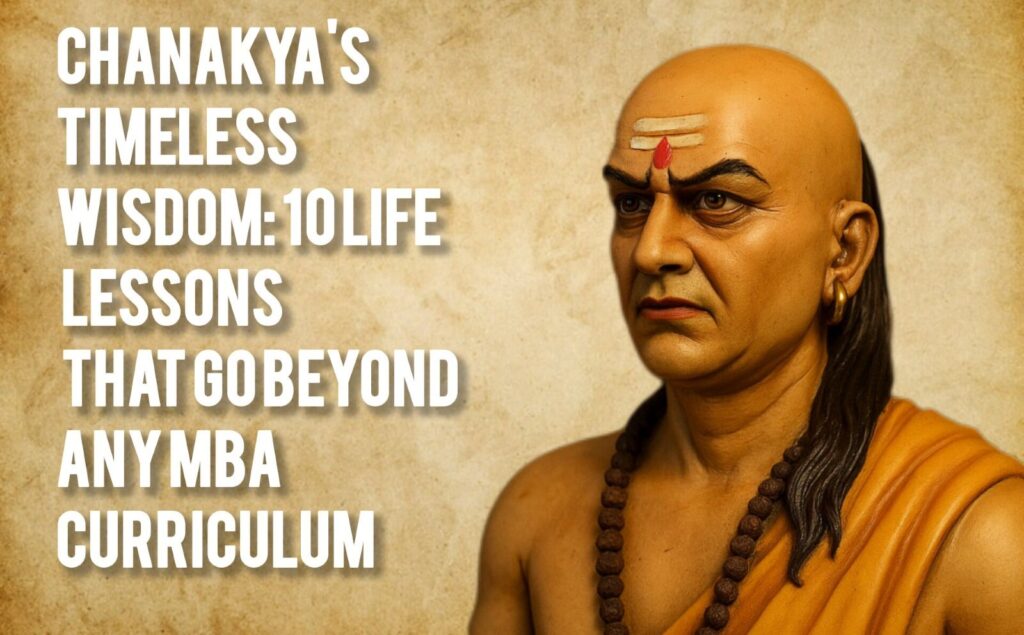Chanakya’s Timeless Wisdom: 10 Life Lessons That Go Beyond Any MBA Curriculum

Chanakya's Timeless Wisdom: 10 Life Lessons That Go Beyond Any MBA Curriculum
In a world overflowing with business schools, motivational podcasts, and leadership seminars, some truths remain ageless—and curiously absent from modern-day education. Long before the Harvard Case Method or MBA playbooks existed, Chanakya, the ancient Indian strategist, economist, and philosopher, had already laid down practical principles for power, prosperity, and human behavior.
What makes Chanakya’s teachings stand out? They are raw, unapologetic, and rooted in realpolitik. He didn’t preach sugar-coated optimism. Instead, he offered a clear-eyed view of the world—how to survive, thrive, and lead with wisdom in a flawed society. His ideas are as relevant to a startup founder in 2025 as they were to emperors two thousand years ago.
Here are 10 life-shaping lessons from Chanakya that no modern MBA program is likely to teach you—but they might just give you an edge that no degree can.
1. Why am I doing this? What will be the result? Will I be successful?
Most people dive into projects based on emotion, trends, or peer pressure. Chanakya believed in deliberate action. Before committing your time, energy, or resources, ask yourself:
What’s my real motivation?
What outcome am I expecting?
How likely is this to work?
This kind of self-interrogation filters out impulsive decisions and keeps your efforts aligned with long-term goals.
2. A person should not be too honest. Straight trees are cut first.
While society often praises honesty, Chanakya saw a flaw: brutal honesty in an imperfect world can be dangerous. If you’re always transparent, you might become vulnerable to manipulation. The key isn’t to lie—but to be wisely selective in what you reveal. Think diplomacy, not naivety.
3. The biggest guru-mantra is: never share your secrets with anyone.
Trust is earned, not automatic. Chanakya warned against handing over your inner circle—or strategic knowledge—on a silver platter. Whether in business or personal life, keeping certain things to yourself preserves your leverage. After all, the less people know, the less they can use against you.
4. The world’s biggest power is youth and beauty.
Chanakya recognized that charisma, energy, and physical appeal hold sway in human interactions. It’s not just about looks—it’s about presence. A confident, energetic demeanor often opens doors that skills alone can’t. First impressions matter. So does your ability to command attention and inspire.
5. If a king is compassionate towards evil, the good will suffer.
Being kind to the wrong people isn’t noble—it’s destructive. Leaders who avoid confrontation with corrupt or toxic individuals ultimately harm the innocent. Whether you’re running a business or leading a community, accountability is non-negotiable. Justice delayed is justice denied.
6. Once you start working on something, don’t fear failure.
Failure is not the enemy—quitting is. Chanakya urged resilience, not perfection. When you take action, you may stumble—but you also gain insights. Every failure is a stepping stone, provided you reflect and adapt. True defeat only comes when you stop trying.
7. Education is the best friend.
Wealth can vanish, connections can break, but knowledge remains yours forever. Chanakya championed the power of learning as a lifelong pursuit. In an ever-changing world, your ability to think critically, understand human nature, and apply knowledge will outlast any trend or market crash.
8. A man is great by deeds, not by birth.
In a time ruled by rigid social hierarchies, Chanakya believed in merit over lineage. Greatness, he said, comes from action—not ancestry. This idea is even more relevant today: your work ethic, ideas, and impact matter more than your resume, family name, or where you went to school.
9. The one who runs after luxury will never be successful.
Comfort can breed complacency. Chanakya noted that the more someone chases indulgence, the further they drift from purpose. True leaders—whether emperors or entrepreneurs—often live simply so they can focus sharply. Luxury is meant to be enjoyed after the mission, not during it.
10. The arrow shot by an archer can be deflected, but the strategy of a wise man cannot.
Physical power is limited. Intellectual strategy, however, shapes empires. Chanakya used wit and long-term planning to overthrow larger forces. In today’s world, it’s not the loudest or the richest who win—but those who outthink the rest. Strategy is the real superpower.
Chanakya didn’t rely on fancy degrees or glossy presentations. He mastered human nature, observed reality without illusion, and played the long game. His lessons remind us that wisdom isn’t always politically correct—but it’s always practical.












